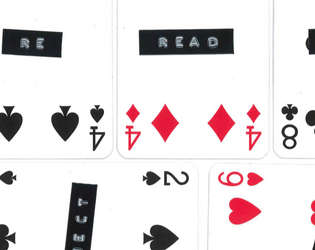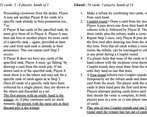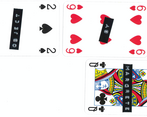Play work of philosophy
let's play shadowgraphs's itch.io pageResults
| Criteria | Rank | Score* | Raw Score |
| Interactivity | #1 | 4.500 | 4.500 |
| Experimentation | #2 | 4.750 | 4.750 |
| Overall | #2 | 4.750 | 4.750 |
| Overall | #3 | 4.050 | 4.050 |
| Polish | #6 | 3.000 | 3.000 |
| Poetry | #8 | 3.250 | 3.250 |
Ranked from 4 ratings. Score is adjusted from raw score by the median number of ratings per game in the jam.
Name you'd like to be published under, if accepted
Cr. Sal----- -----s
Short bio, written in the third person
Cr. Sal----- -----s is an obvious pseudonym for a former philosophy student stuck in Scandinavia. When not freelancing, Cr. teaches what they love, helps with projects relating to literature, technology, and culture, and tinkers with proposals for PhD applications. Her greatest joy would be to combine the academic and the creative in a way that brings something new to people and makes them feel grateful they're alive.
Artist Statement, about your piece
This is a proof of concept for my PhD project. Its intention is to show how the philosophical and the literary meet in ways that go beyond reading novels -- whatever "reading" really means; and to demonstrate by example how both canon-critical and original works in philosophy can be done outside the confines of the now-standard treatise, essay anthology, or journal article.
About eight years ago now, my mentor-professor-friend gave me an optional assignment to write a ghazal in a poetry workshop, and I got the idea to write it in short phrases on a pack of cards. I played hard and fast with the form and didn't give much thought to how it'd work when it was used for games like Go Fish, so the "poems" it generated were fragmentary in a way that had very little forward momentum. I still remember his advice -- to really wrestle with how it might play -- and wanted to see what I'd learned about what makes a poem "move" since. I hope I've done the assignment better justice this time.
I chose "Shadowgraphs" as its hypotext because I'd like my PhD project to deal primarily with Søren Kierkegaard's "Either/Or," and felt that ghazals generated by pack of playing cards fit that bit of it well.
I slapped the poems within each suit together very quickly, then played some card games with my boyfriend to see how coherent the deck felt -- and was surprised to find it worked so well! I think that's a testament to how tight "Shadowgraphs" is thematically.
What do you need from us, when giving feedback on your piece?
What made you smile while you played?
What made you want to quit?
How did the companion pieces (letter, essay) affect your reception of it?
And if you've read "Shadowgraphs" yourself -- how did this game and its companions change your impression of it, if at all?
Questions, Comments, Concerns?
None! This is my first jam. Thank you so much for organizing it and offering to give feedback.
Leave a comment
Log in with itch.io to leave a comment.








Comments
Hi incorrigible! First off thank you SO MUCH for playing so many of these games and giving awesome thorough feedback. You seriously rock and I'm grateful for your presence here. And welcome to your first game jam!
This game was fun once we were finally able to start playing. In hindsight it would have been easier to print and cut the cards, but I just used a deck and had to search the 5 deck PDFs for each card. It was especially tedious because they weren't organized by suite or anything, but we got there eventually! This if anything made me want to quite (just a simple out-of-loop failure that would have been avoided altogether had we just printed to cards).
I played the 2 player one, and the instructions were unclear (?) at the onset so we ended up both picking a card and revealing it at the same time for the refrain. Our refrain was the very poetic "before through" 😂This made us both laugh and smile, a happy accident of the game. I honestly was impressed with the end result as well — I was a bit skeptical of a coherent poem forming, just because I felt like my hand was more nouns than verbs, but it came out pretty neat:
before through
gender, my mirror
wed honor as
success. object so
one solve(s) rapture
The companion pieces made this feel extremely fleshed out! Not only are they marvelously written, they add a narrative element to it that builds the world for me. I got pulled in. While I've never read Shadowgraphs, now I want to.
Overall I loved this as a poetic experience, and am very impressed by the ingenuity it must have taken to make. Very well done!
P.S. I don't think I have time to record myself playing the solo on today (before voting closes), but I'm going to try to do it next week, when I have more time!
It was my pleasure, hehe! Thank you for getting such a cool group of people together.
-- Oh god, I'm so sorry for the hassle searching through the PDFs for each card's term must have been for you. When I was making them I got kind of carried away with the idea of submitting these sheets as five separate poems of their own, since "Fish" and "Sevens" show how each rank and suit, respectively, is a poem, but if there's anything I've learned in this game jam, it's to focus on making the content as playable/approachable as possible from the get-go! I'll include a reference file where people can check what each suit/rank combination corresponds to in a future version, and an (out-of-character?) guide on how to put your own deck together.
In the "Ghazal" game, I'd envisioned people picking the refrain consciously (so, not blindly -- Player A would put something down, and then Player B would find the card in their hand that they felt went best with it), but I really like how you guys did it! A clearer instruction manual (possibly with diagrams? lol) is something I'll include in future versions, too. I'm glad you guys liked the poem you came up with; I find the deck generates very friendly/subversive things relative to its source text. (You mentioned you want to read "Shadowgraphs," and while I adore Either/Or more than almost any other book, the whole thing's a bit of a slog and "Shadowgraphs" in particular can read misogynistic. If you end up checking it out, please let me know! I could talk about that book forever.)
And oh my gosh, it's so kind of you to offer recording yourself playing! In lieu of that, we can play a round ourselves over Discord using a key for which terms go with which cards and an emulator like this one, if you like -- just let me know!
I'd love to!! Let's chat about it when you can
I've played the solitary game and I tried to play Ghazal by myself when handling 2 hands.
I'll provide more remarks on the game-side as I'm way more confident with this (as a game designer).
I really like the idea of combining card games with poems so for the experientation I give 5. It's clearly innovating with the medium.
For the interactivity I'll give it 4. This game exists solely through interaction and I would have givent it a 5 if the resulting interaction always was producing verses or poems. It's not always the case, sometimes the interaction takes over the poetry.
For the polish I'd give a 2. For me it's a prototype which still needs testing with players. I found the rules not explicit enough, which for a game is a big problem, a game is a set of rules. For example what does it mean that cards "cohere"? are they a pair of identical symbols, or figures, or just that words from the two cards seem coherent?
For solitaire I just went with my own set of rules to be able to play the game, but for the Ghazal I really had difficulties, I do not know what is expected from me (I suppose when you know what Ghazal is maybe it's easier, but I've read the wiki page on Ghazal and it didn't help at all, so I went with my own rules but playing by myself it wasn't fun so I stopped).
For the solitaire, what is absent is the explication on "cohere" and also the numbers associated with figures (I assumed J = 11, Q=12 et K=13, A = 1 but what do I do with the king in this case as it is 13 all by itself, => I changed rules to pair it with J= 0 and two kings which "cohere" I guess ?). But what was detrimental to my experience is that solitare game actually requires remembering cards, it's a lot of mental effort so the poetry is left a bit on the side. Either I try to play solitare or I'm doing a poem. Not two at the time. And frankly solitaire isn't an interesting game, especially if you don't put the mental effort. So the game part isn't fun. it's not a problem generally, but usually what is expected from card games is that they are fun, challenging etc. What I did to make it more fun was read the words aloud and it sort of became a poem I guess. But I don't know if this is intentional.
Lastly, the game requires a certain effort from the player to prepare, cut out all the cards, each card has to be cut out separately etc. that's not something a casual player will be willing to do, For a finished game I suppose it would be better to create your own cards that are layed out nicely on 3-4 pages and that can by cut easily all at the same time with a guilotine (much quickier). But for the prototype the format you gave is perfectly ok !
For the poem I'm giving 3, because as it is, it's more a game than a poem. I see the potential. and I guess it would benefit or play better if the game rules part was diminished, use simplier games like asimple tarot game, where you just lay the cards in no particular order creating word verses etc.
I liked the letters that accompagny your game-poem, it's a pity that they don't really have any influence on whats happening during the game. but they definitely give this a sense of sort of holisting experience, a game that exists in some fictional world. I really liked this.
but all in all it's a very interesing piece :)
congrats on taking the risk!
Thank you for leaving such a thorough comment, and for giving some of the games a try! I hope you play some of the multiplayer ones sometime, or try the ghazal one with another person -- as you've pointed out, it doesn't work very well when you play it alone, and much of the fun of the deck is in using it with others. (I threw in the Solitaire game just so prospective players could realize that there are ways to play with it by themselves. Incidentally, the way you ended up playing it is the way I hoped people would!)
In any case, I really appreciate your feedback on the rules! "Fish" was adapted from this website and "Pyramid" from this one, but the rest I'd learned from others I'd played cards with in person. I was trying to keep the instructions within the limits of a single page, so I was banking on my audience having some prior familiarity with them (at least enough to recognize to which classic game each set of rules corresponded if they felt puzzled, and to know J = 11, Q = 12, K = 13). I'm sorry for any confusion/frustration because of that! I will definitely run the "Ghazal" game through more tests and watch some of my friends play it to figure out where the unclarity lies. I'm curious -- what rules did you come up with when you played it to make it work for you?
As for my use of "cohere" in the instructions: In future versions, I will consider making it clearer that I mean verbal coherence, but I also wanted it to be vague enough for people to put, say, "passion" and "rapture" together and for this to feel legitimate (even though this is not a coherent set of words without an "and" inserted between them). I wanted the deck to be seen as an occasion for players to negotiate the meanings of different terms and the ways they might go together.
Your suggestion to make my own cards is a great one, and I hope I can once I have more time! I also hope I can someday make a digital version where players can save/use decks that have words of their own choosing, but I still need to get the coding chops for it...
the way you describe "cohere" is great, you could just take this paragraph and put it in the rules. it's an explicit rule : "interpret this rules as you feel / want". in fact, many experimental games have this as rule ;)
I'm pointing this, because culturally I'm used to the fact that card games' rules are very explicit if not otherwise stated (epecially with traditional 52+2 card'sz deck in use) but again this is my perspective as game designer.
For Ghazal I tried matching figures, I though of matching suites but I never had any. I did not understand how to put the verse with the couplets. the free phase was cool. In the end I just tried to make 3-5 word phrases at random. I admit i enjoyed my solitaire game more.
To solve the rules length problem you could maybe imagine this as a small zine, with the letters you've put in separate files and have one page where you just list the games with a brief description + photo and then a separate page for each game rules, use more images (ex. photos of example games), have more examples.
I really enjoyed the fact that it is a physical game, and though making a digital game gives opportunity to have more words etc. I fiand that "playing"/"toying" with this poem is it's biggest quality. I would rather iterate on this version, make it more accessible, quicker to set etc. rather that going digital but it's your call :)
players can always use tape to paste our own words just like you did. I mean the rules for the game could be litteraly: "take an old deck of cards and paste this list of word on them" ;)
I haven't read Shadowgraphs and I'm not overly familiar with philosophy so I was a bit intimated by the piece. I really enjoy the look and feel. Love the combination of poetry and card games (an unusual but fun pairing). Very innovative and I would love to see more work!
Just to be clear: the following opinions belong to @lynchpoet, one of the people whose work is featured on the Misery Tourism itch.io. I submitted work to this jam, so I'm voting here, but we're a collective.
I like this a lot, even though I'm not into philosophy (and I think that most of the textual stuff from Kierkegaard has gone over my head).
EXPERIMENTATION: I give this a 4 for experimentation, because the elements of the ghazal it uses—specifically the audience/public participation aspect common in mushairahs, mixed with the mechanical lens of the cards—create an atmosphere in poetry that I don't really believe exists in the traditions of recitation and presentation that I've personally seen. Further, the cards present a fairly unique way of generating public participation around an artist's work that is really awesome (you mention in the essay that you can basically play this with poems you create, which is great). I know of some games that do similar stuff with haiku ( Poet Glorious by Kimberley Lam is one example I can think of off the top of my head ), but the use of the ghazal as the centerpiece, and the goal of the work to, as you put it, "...demonstrate by example how both canon-critical and original works in philosophy can be done outside the confines of the now-standard treatise, essay anthology, or journal article" is incredibly out there. The idea of having some kind of philosophical debate or forum (or even an academic dissertation, or, fuck, even a diatribe/manifesto of some kind) based around a game, where the mechanics inform and arbitrate, is pretty wild shit.
INTERACTIVITY: I give this a 5 for interactivity, since, uhh, it's literally all interactivity. It's play that generates discussion. Sweet. The companion pieces were cool, and definitely helped me understand the context of the philosophy better, so even if those aren't strictly interactive, I think they serve an important purpose.
POLISH: I think this is a pretty polished piece (leaning towards 4). One thing I wasn't 100% clear on is how to choose a winner in the Ghazal (the game text mentions a winner at step 6, and I think it's the person who runs out of cards, but what happens if both players decide the verse is complete?). Could just be something I'm missing.
POETRY: This occupies a space at the literal intersection of poetry and gaming (in all senses of that word). I'm giving it 3 to represent that. I wish that instead of a 5 star thing, I could just give the answer "Yes" to the question: "Is this a poem or is it a game?"
Thank you so much for such a kind, thorough response! I'm so glad you enjoyed it, and that you think the animating idea's out there in a good way, hehe. I'll definitely check out the piece you mentioned -- I'm really happy to hear other people are making things like this.
To answer your question about the ghazal game instructions: Gosh, I really couldn't figure out the extent to which any of the instructions were clear, so I appreciate any and all questions about (and suggestions for) them! The winner of "Ghazal" is just whoever runs out of cards first. This (insofar as I played it out myself with a partner) doesn't depend on whether any given verse is considered "finished" by the players, even in a "Free" round. One of two things can happen in a Free round: Either both players decide that the verse is finished and continue playing (because they both have cards in their hands), or one player runs out of cards to put down during that round, bringing an end to the entire game. A winner isn't exactly "chosen;" it just happens naturally in the course of play. The strategy during Free rounds is to string out the verse in such a way that the other player's forced to pass or that brings the verse to an obvious end. Does that make sense? (Totally chill if it doesn't! I can take another crack at explaining.)
Ahh, yeah gotcha. That makes sense.